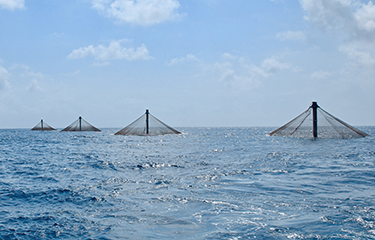Boston, Massachusetts, U.S.A.-based Innovasea said it has helped Benguela Blue Aqua Farming successfully secure permits to raise Atlantic salmon in submersible net pens eight kilometers off the coast of Namibia.
The farm, to be located offshore from the town of Lüderitz, will use Innovasea’s submersible SeaStation pens, the company said. Innovasea has produced a number of open-ocean farming technologies, including submersible fish pens, aeration and oxygenation systems, and data retrieval systems.
“We’re thrilled to be partnering with Benguela Blue Aqua Farming on this important project to bring open ocean aquaculture to southern Africa,” Innovasea Senior Vice President of Business Development Langley Gace said in a release. “The company has a strong business vision and has worked closely with authorities in Namibia to develop a smart, realistic plan to safely raise healthy fish and create good-paying jobs for the local economy.”
Innnovasea said its consulting service helped Benguela Blue secure the permitting needed to run a “trial operation” to run up to four of its SeaStations, as well as a permit to raise 35,000 metric tons (MT) of fish annually.
Benguela Blue Aqua Farming Co-Founder and Executive Director Johannes Aldrian said the company is proud to be the first to bring sustainable aquafarming to the country – and that the area it plans to locate its farms has “excellent water conditions and enormous potential.”
The location is not without its challenges. Strong surface currents and high wave heights would pose problems for traditional net pens that sit on the surface – part of the motivation behind using Innovasea’s submersible SeaStation pens, which will be able to avoid most of the wave energy.
“The open ocean is the future of fish farming and provides a healthier, more natural environment for fish by reducing their exposure to pathogens,” said Gace. “But it requires robust equipment like the SeaStation and our submerged grids to withstand the day-to-day punishment of the sea.”
According to Innovasea, the SeaStation is the “world’s toughest fish pen” and has proven its durability by surviving hurricanes, typhoons, and other storms “unscathed” over the last 28 years.
Namibia has a robust fishing industry, with large companies like Nueva Pescanova Group operating fishing fleets in the region. The Benguela Current System creates a productive fishing ground regionally, and the country’s government auctions off thousands of tons of quota for species like horse mackerel each year.
However, the country’s aquaculture production is relatively low – with the world bank estimating the country only produced 321 MT of aquaculture products in 2020.
The new Benguela Blue project aims to change that, and its pilot facility – which the company estimates will begin operations in Q2 2024 – will have a first harvest of around 100 MT.
“We’re optimistic that Namibia’s stable governance will encourage other companies to follow our lead to help create a thriving fish-farming industry,” Aldrian said.
Photo courtesy of Innovasea







